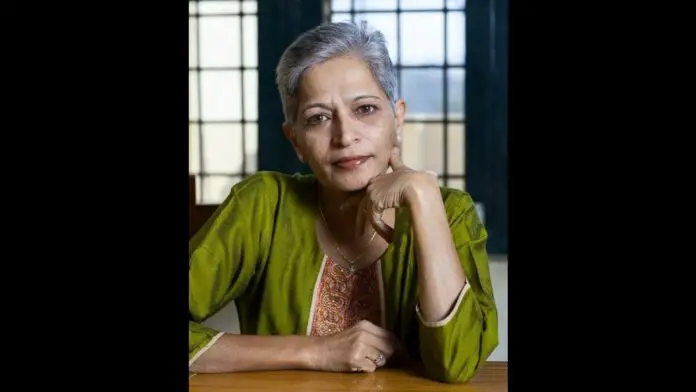
The Supreme Court of India, today postponed its decision in an appeal challenging a Karnataka High Court ruling dismissing charges brought against one of the accused in the killing of journalist Gauri Lankesh under the Karnataka Control of Organized Crimes Act (KCOCA).
The High Court erred by failing to examine the scheme of Section 24 of the KCOCA, which provides that no Special Court may take cognizance of any offence under the Act without the prior permission of a police official not lower than the level of Additional Director General of Police. It was pointed out that the same was followed in this situation.
“You can claim that there isn’t enough proof. The chargesheet has been overturned by the High Court. This is wrong, and it goes outside the scope of the law. It can’t be suffocated in this manner. Because the chargesheet was not properly analysed by the High Court, we must conclude that the chargesheet was incorrectly handled by the High Court “According to the Bench.
The decision in question before the Supreme Court was issued on April 22, 2021, after the Karnataka High Court overturned the Bengaluru Commissioner of Police’s order from 2018 and the subsequent supplemental chargesheet. Nayak’s charges under Sections 3(1)(i), 3(2), 3(3), and 3(4) of the KCOCA were thus dismissed.
According to the Supreme Court appeal, Nayak was actively involved in giving refuge to Lankesh’s assassins both before and after the crime was committed.
The High Court erred by failing to examine the scheme of Section 24 of the KCOCA, which specifies that prior approval should not be provided by any official below the rank of Additional Director General of Police, which was fully followed in this instance
Although benefit might be provided to accused Mohan Nayak prior to the clearance stage, the act of quashing the chargesheet against him was “incorrect,” according to the Bench of Justices AM Khanwilkar, Dinesh Maheshwari, and CT Ravikumar.
Even if the Supreme Court upholds the High Court’s decision, “nothing prohibits the investigative agency from determining if you are a member of the syndicate, and if you are, you can be prosecuted.”
The Court’s reasoning was supported by the following:
“Let’s say there’s a group of 20 people. Four people prepared ahead of time, while others attacked first. Will the planners be prosecuted as conspirators or abettors merely because they didn’t go through with it? They are still members of the club.”
The accused, Mohan Nayak, was represented by Senior Advocate Basava Prabhu S Patil, who maintained that his client had no participation in the actual conduct of the crime. Furthermore, if he were to be enlisted under the KCOCA, there is no evidence of his involvement with the criminal gang. The Bench, on the other hand, noted that these concerns may be observed throughout the trial.
The Court authorised the parties to make written arguments while reserving orders on the appeal.
The petition said that Nayak had applied to the Karnataka High Court for bail after the High Court had dismissed proceedings against him under the KCOCA.








